Automation
• 18 min read
Top 16 Business Process Management Tools [2024 Updated]
20th September, 2022
SHARE ON:
Driving your action requires effective business processes, empowering teams to efficiently perform their tasks and monitor progress.
Business process management (BPM) involves creating, analyzing, monitoring, and transforming core business processes. It identifies opportunities, successes, and challenges by continuously monitoring these processes. That's where business process management tools become crucial for your organization.
Business process management is a systematic and strategic approach to achieving optimized business outcomes by aligning organizational functions with specific goals. This empowers IT teams to deploy, monitor, and measure company resources effectively.
Through business process management, organizations can significantly enhance efficiency and productivity while minimizing costs, mitigating risks, and maximizing return on investment. Implementing BPM tools offers valuable insights into the organization's progress in meeting its business goals. These tools play a crucial role in modeling, implementing, and automating business workflows, ultimately enhancing overall performance.
This article discusses the top 16 business process management tools available today. But before delving into these tools, let's explore them more.
What Does Business Process Management Mean?
Business Process Management (BPM) systematically and efficiently manages an organization's business processes. It involves designing, implementing, monitoring, and optimizing the various activities and tasks that make up a business process to achieve specific goals and objectives.
BPM often includes the use of technology to automate and facilitate the execution of processes. This can involve the use of software tools, workflow systems, and other technologies to support and optimize the flow of activities within an organization.
The ultimate goal of Business Process Management is to create a more agile and responsive organization that can adapt to changes in the business environment, improve customer experiences, and maintain a competitive edge in the market.
What Does Business Process Management Tools Do?
Business Process Management tools are software applications designed to facilitate and streamline the various aspects of BPM. With capabilities like process visualization, workflow automation, real-time monitoring, and seamless integration, these tools contribute to heightened efficiency, agility, and continuous improvement within organizations. They play a pivotal role in managing, optimizing, and automating business processes, offering a range of features and functionalities to support these objectives.
Here are some common features and functionalities of BPM tools:
Process Modeling and Design: BPM tools often provide a graphical interface for modeling and designing business processes. This allows organizations to visually represent their processes, including tasks, decision points, and interactions.
Workflow Automation: Automation is a key aspect of BPM. These tools enable the automation of repetitive and manual tasks within a business process, reducing errors, increasing efficiency, and ensuring consistency.
Process Monitoring and Analytics: BPM tools allow organizations to monitor the performance of their processes in real-time. This includes tracking key performance indicators (KPIs), identifying bottlenecks, and generating reports for analysis.
Integration Capabilities: BPM tools often integrate with other systems and applications within an organization. This integration capability ensures seamless data flow and communication between different parts of the business.
User Collaboration: Some BPM tools include features that facilitate collaboration among users involved in a process. This can include task assignments, communication channels, and document sharing.
Rule Engine: Many BPM tools include a rule engine that allows organizations to define and enforce business rules within their processes. This ensures consistency and compliance with organizational policies.
Mobile Access: With the increasing need for flexibility and remote work, many BPM tools offer mobile access. This allows users to interact with and monitor processes from mobile devices.
Simulation and Optimization: Some BPM tools provide simulation capabilities, allowing organizations to model and simulate process changes before implementation. This helps identify potential issues and optimize processes for efficiency.
Security and Compliance: Security features are essential in BPM tools to protect sensitive data. Tools often include features to help organizations comply with industry regulations and standards.
Continuous Improvement: BPM tools support the concept of continuous improvement by providing insights into process performance. This allows organizations to identify areas for optimization and make iterative improvements over time.
Why Are Business Process Management Tools Essential?
In an era marked by increasing complexity and competition, BPM tools play a pivotal role in achieving operational excellence. Business Process Management (BPM) tools are essential for several reasons:
Efficiency and Optimization: BPM tools enable organizations to identify inefficiencies and bottlenecks within their processes. These tools enhance efficiency by automating routine tasks and streamlining workflows, reducing manual errors and processing time.
Agility and Adaptability: In a rapidly changing business environment, organizations need to be agile and adaptable. BPM tools provide the flexibility to modify processes quickly, allowing businesses to respond effectively to market changes, customer demands, and internal requirements.
Visibility and Control: BPM tools offer real-time monitoring and reporting capabilities, giving organizations visibility into their processes. This transparency allows for better decision-making, as managers can track progress, identify areas for improvement, and ensure compliance with established standards.
Customer Satisfaction: Streamlined and optimized processes contribute to improved customer experiences. BPM tools help organizations deliver products and services more efficiently, increasing customer satisfaction and loyalty.
Compliance and Risk Management: Many industries are subject to regulatory requirements. Business process management tools help organizations ensure compliance by implementing and enforcing standardized processes. Additionally, they contribute to risk management by identifying and addressing potential compliance issues before they become significant problems.
Resource Optimization: By automating repetitive tasks and optimizing workflows, BPM tools help organizations better use their resources. This includes human resources, time, and technology, leading to cost savings and improved resource allocation.
Continuous Improvement: BPM tools support the concept of continuous improvement by providing insights into process performance. Organizations can analyze data and metrics to identify areas for optimization and implement changes iteratively over time.
Collaboration and Communication: BPM tools facilitate collaboration among team members involved in different process stages. They provide communication channels, task assignments, and document-sharing capabilities, promoting a more collaborative and communicative work environment.
Competitive Advantage: Organizations that effectively implement BPM tools can gain a competitive edge in the market. The ability to adapt quickly, deliver high-quality products and services, and respond to customer needs positions businesses for success in a dynamic business landscape.
In short, BPM tools are crucial for organizations seeking to enhance their operational efficiency, adapt to changing conditions, ensure compliance, and ultimately achieve a competitive advantage in their respective industries.
Now that you know the benefits, let's explore the list of business process management tools:
List Of 16 Best Business Process Management Tools
Let's explore the 16 business process management tools in 2024 with us.
1. Zluri
For those seeking a cloud-based application to seamlessly automate intricate and repetitive IT tasks, look no further than Zluri — the ultimate solution for your IT team. Offering limitless possibilities, Zluri transforms your operational landscape by eradicating manual processes and championing automation. This empowerment opens avenues for your team to achieve heightened efficiency and productivity.
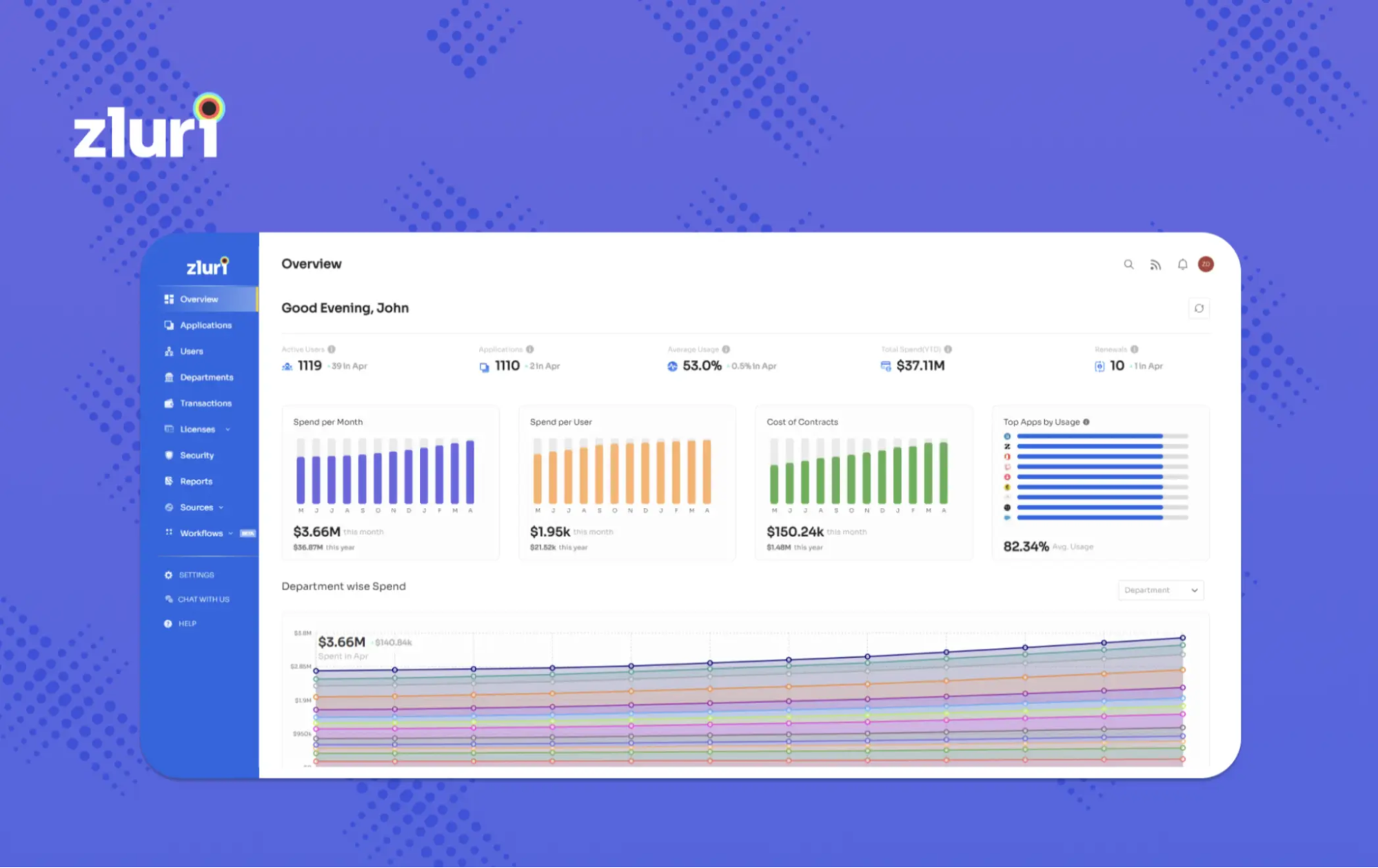
But how exactly does Zluri bring about this transformative change?
Zluri stands out as a leading SaaS management platform celebrated for its automation and seamless integration prowess. Through its seamless integrations, it effortlessly connects with diverse systems, providing IT teams with a unified view of IT processes on a single dashboard. This streamlined approach enables the automation of numerous IT tasks through efficient workflows.
It excels in automating routine IT tasks, such as user provisioning and deprovisioning, app approval workflows, app requisitions, vendor management, etc. This automation proficiency allows your teams to shift their attention to critical issues, substantially improving overall efficiency and accuracy while minimizing the risk of human error.
Zluri's Key Automation Workflows:-
Automated SaaS App Discovery & Management
Zluri transforms SaaS application discovery through automation, eliminating the need for manual tracking with spreadsheets and emails. Our platform serves as a centralized hub, ensuring effortless discovery and management of all your SaaS applications.
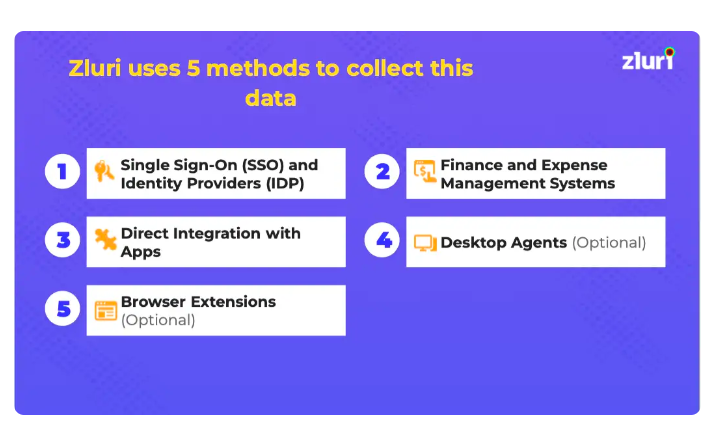
It employs five advanced methods, including Single Sign-On (SSO), finance & expense management, API integrations, optional desktop agents, and optional browser extensions, to accurately identify 100% of SaaS applications within your organization.
This robust automation guarantees that IT teams stay consistently informed about the complete SaaS stack. Furthermore, Zluri seamlessly integrates with over 800 apps, facilitating swift identification of application usage, users, and purposes.
Efficient Onboarding and Offboarding Automation
Experience streamlined onboarding and offboarding processes with Zluri, empowering IT teams with automation for heightened efficiency and productivity. Our platform provides a comprehensive SaaS management system, eliminating manual tasks and optimizing resource utilization.
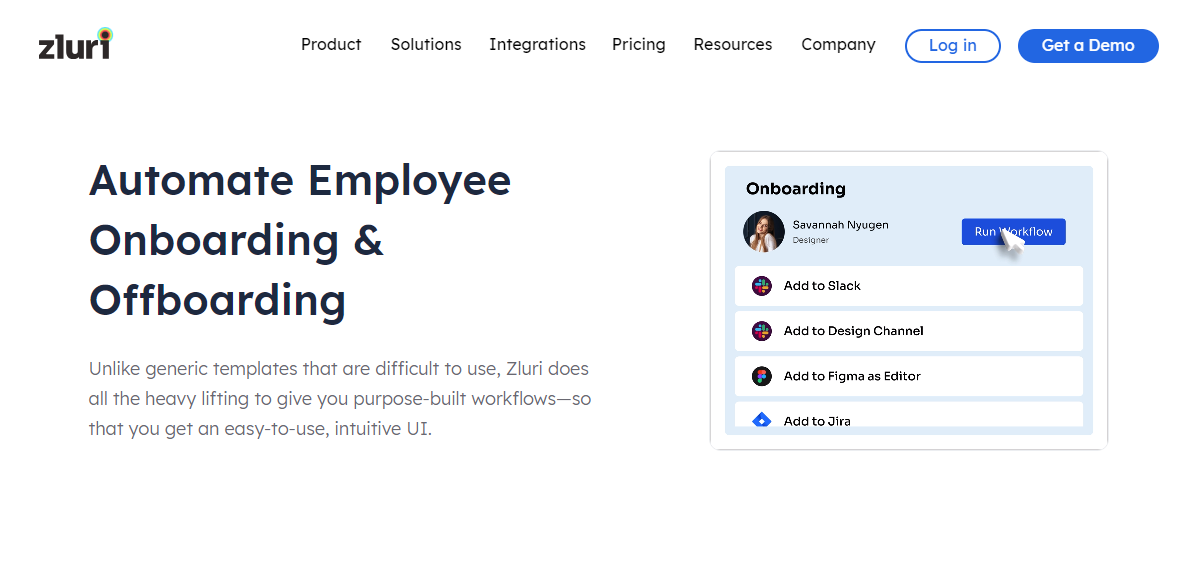
Automated Onboarding:
Zluri simplifies the onboarding experience for new employees, facilitating swift access to essential tools and applications. It seamlessly integrates with popular SaaS tools and acts as a centralized repository for every employee's information, ensuring real-time insights into SaaS usage.
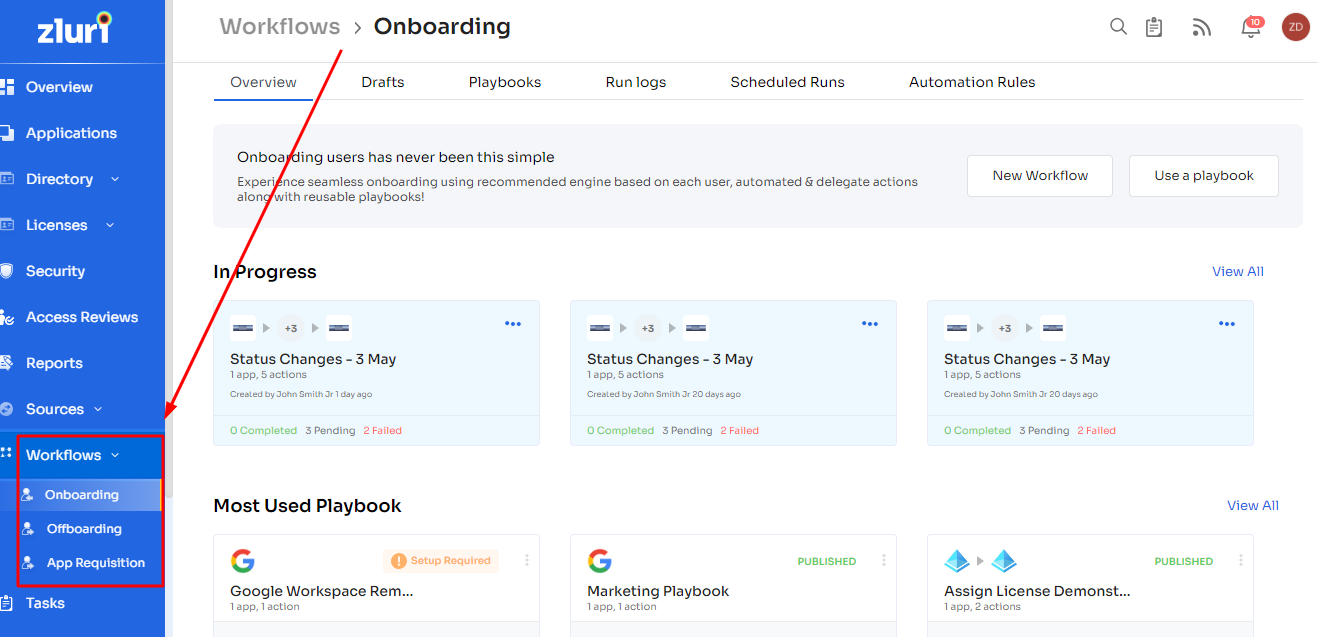
Seamless Offboarding:
Zluri streamlines the offboarding process, systematically completing crucial tasks when employees depart. Automated offboarding ensures the prompt revocation of data access rights, fortifying your organization's data security. Furthermore, it securely backs up data and dispatches it to the respective team members.
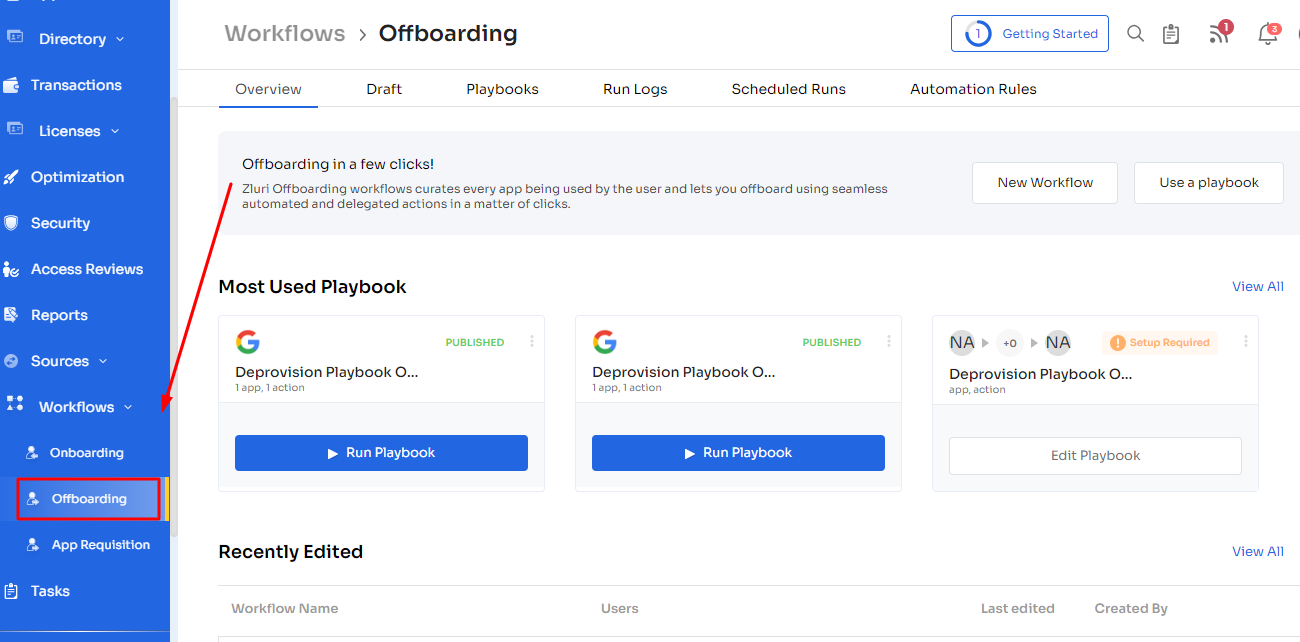
Efficient SaaS License Management
Zluri introduces automated SaaS license management, providing organizations with the tools to enhance efficiency and minimize costs. Our advanced technology streamlines the management of licenses and guarantees adherence to licensing agreements.
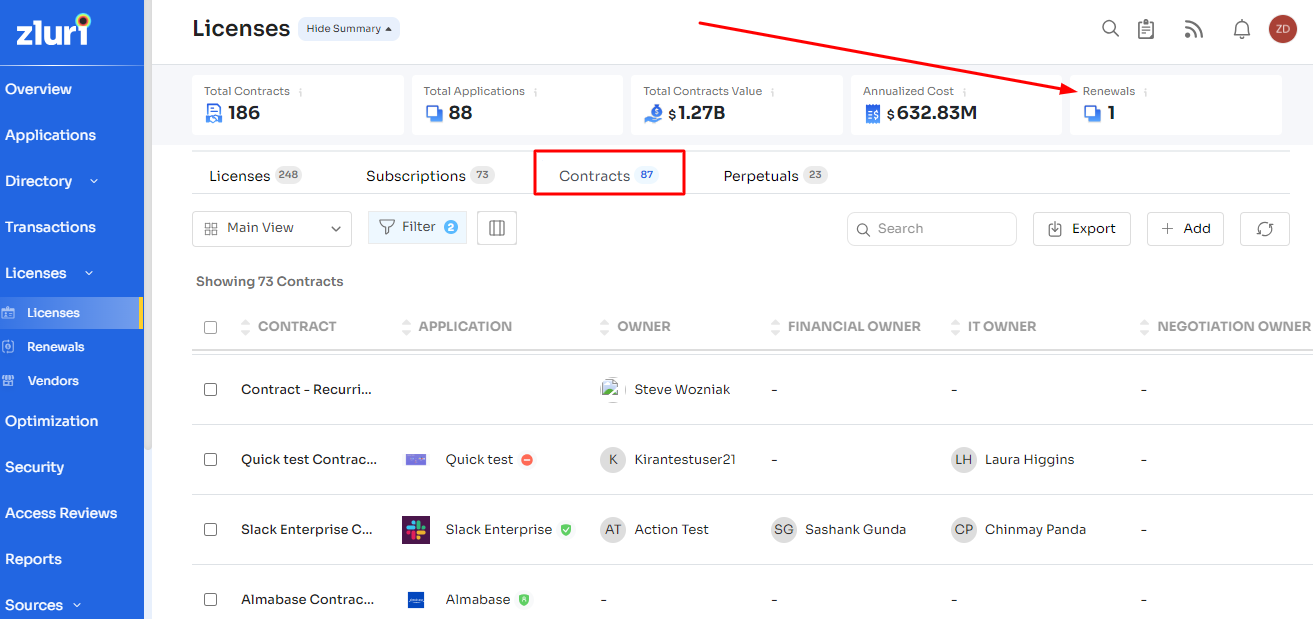
Additionally, Zluri delivers comprehensive insights into vendors and contracts linked to each license. This transparency extends beyond internal employees, enabling you to monitor licenses assigned to external users, including vendors, freelancers, and consultants. This ensures a comprehensive view of your software licensing landscape.
Automated User Monitoring and Reporting
Zluri transforms IT monitoring and reporting by seamlessly integrating with existing systems, delivering real-time insights into SaaS application performance. With effortless integration into tools like Google Analytics and Salesforce, Zluri eliminates manual data tracking, minimizes errors, and provides a precise understanding of business performance.
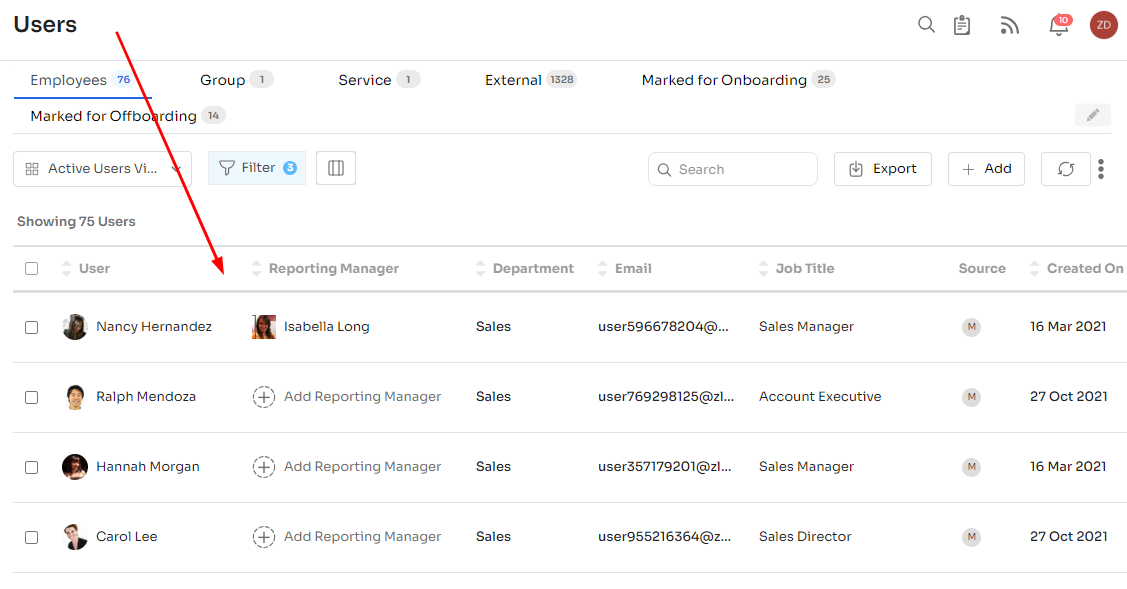
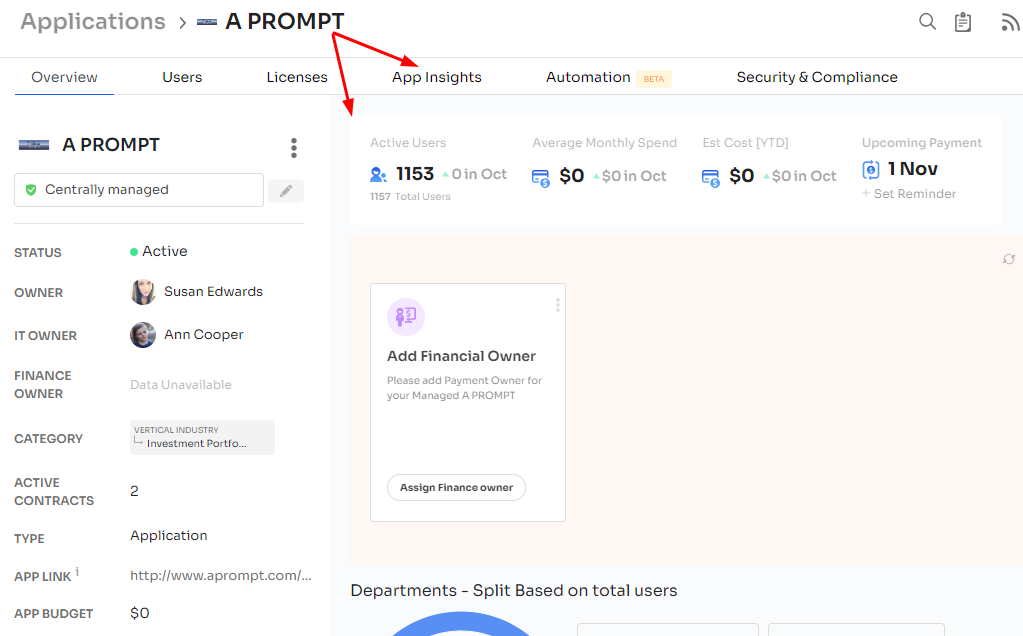
Additionally, Zluri offers tailored reporting solutions, ensuring easy access to customized reports aligned with specific business needs, whether weekly, monthly, or quarterly.
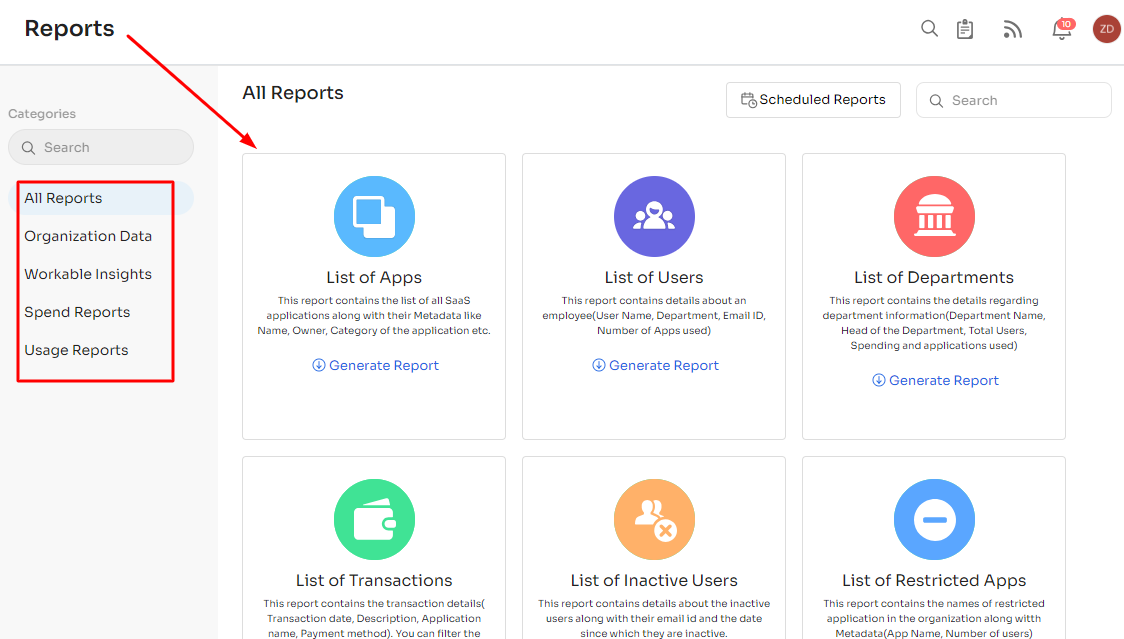
Zluri provides tailored reporting solutions, offering easy access to customized reports aligned with your organization's specific needs, be it weekly, monthly, or quarterly, precisely when needed.
Automated SaaS renewal management
Zluri's centralized system provides organizations with comprehensive visibility into SaaS applications and contracts, facilitating data-driven decisions for renewals based on usage and performance metrics. The Renewal Calendar offers clear overviews for upcoming renewals, enabling proactive planning based on size and timelines.
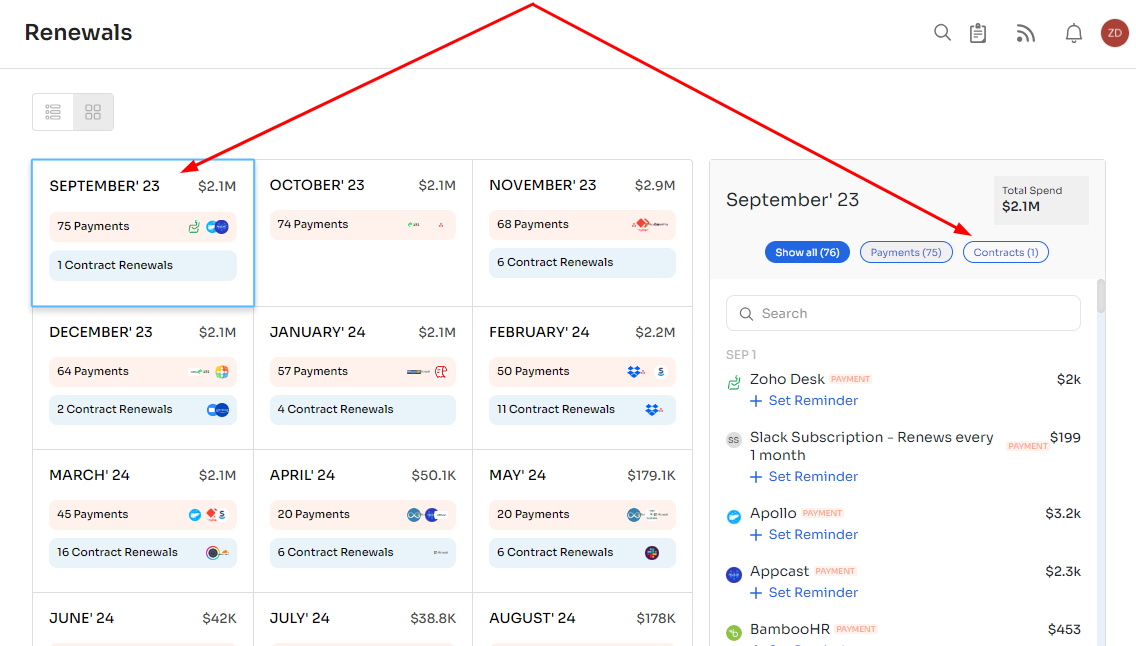
The platform automates renewal date reminders, cost tracking, and vendor negotiation, which is accessible from a centralized location. Timely notifications, including advance alerts for contract and payment renewals, enhance the optimization of license agreements.
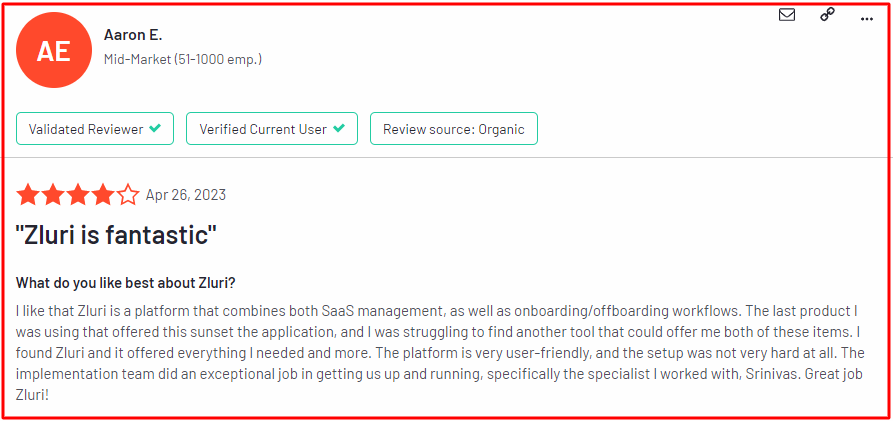
For efficient IT processes and enhanced team productivity, explore Zluri—a solution crafted to help you achieve your objectives. Book a demo today.
Customer Rating
G2: 4.8/5
Capterra: 4.9/5
2. Pipefy
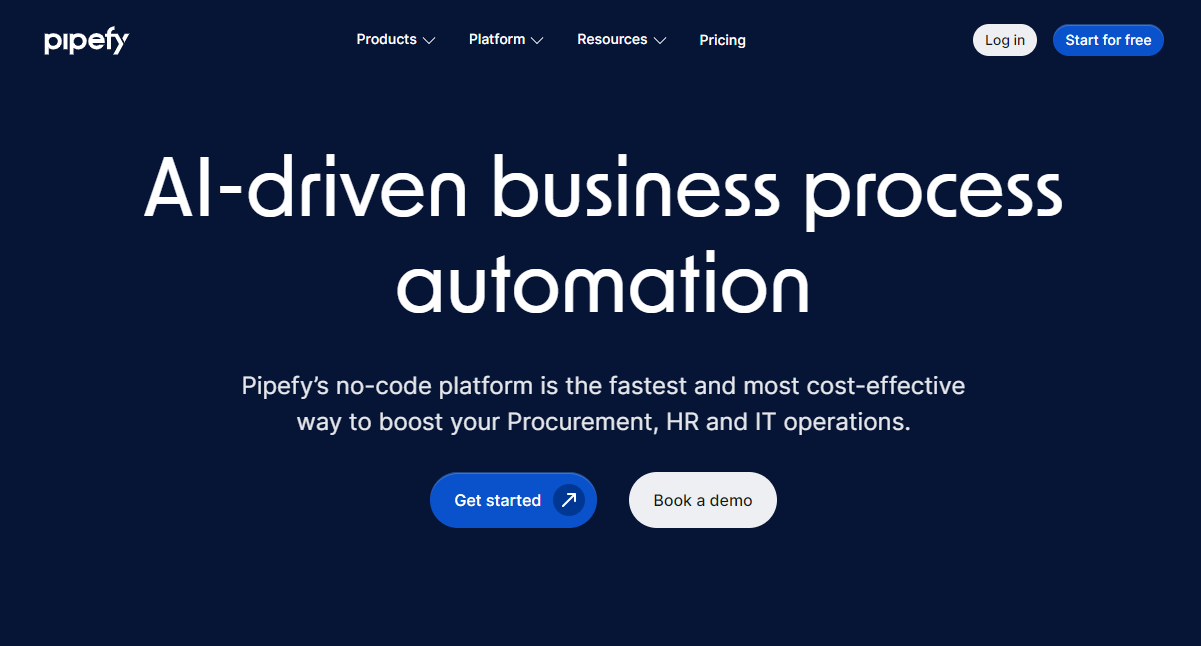
Pipefy stands out as an intuitive workflow management software designed to streamline corporate processes seamlessly. Offering a quick-to-deploy, no-code approach, Pipefy enhances speed, visibility, and overall efficiency without the need for extensive IT setup.
Through end-to-end operations, low-code platform workflows, and effective integration and automation, the platform ensures a secure and optimized handling of business processes, delivering high-quality results. With process visualization and integration features, your IT teams can create and customize workflows according to their requirements.
Key Features:
Sprint Panel for Task Organization: Users benefit from Pipefy's innovative sprint panel feature, facilitating the seamless organization and management of weekly tasks. This enhances productivity and ensures a structured approach to task execution.
Intuitive UI with Inventory Tracking: Pipefy boasts an intuitive user interface that simplifies the user experience. Additionally, the platform allows users to effortlessly track their inventory, providing a comprehensive view of resources and assets within the organization.
Efficient Report Generation for Informed Decision-Making: Pipefy empowers users to generate efficient reports. This functionality enables informed decision-making by offering insights into processes, allowing users to identify areas for improvement and enhance overall system performance.
Customer Rating
G2: 4.6/5
Capterra: 4.6/5
3. IBM Business Process Manager
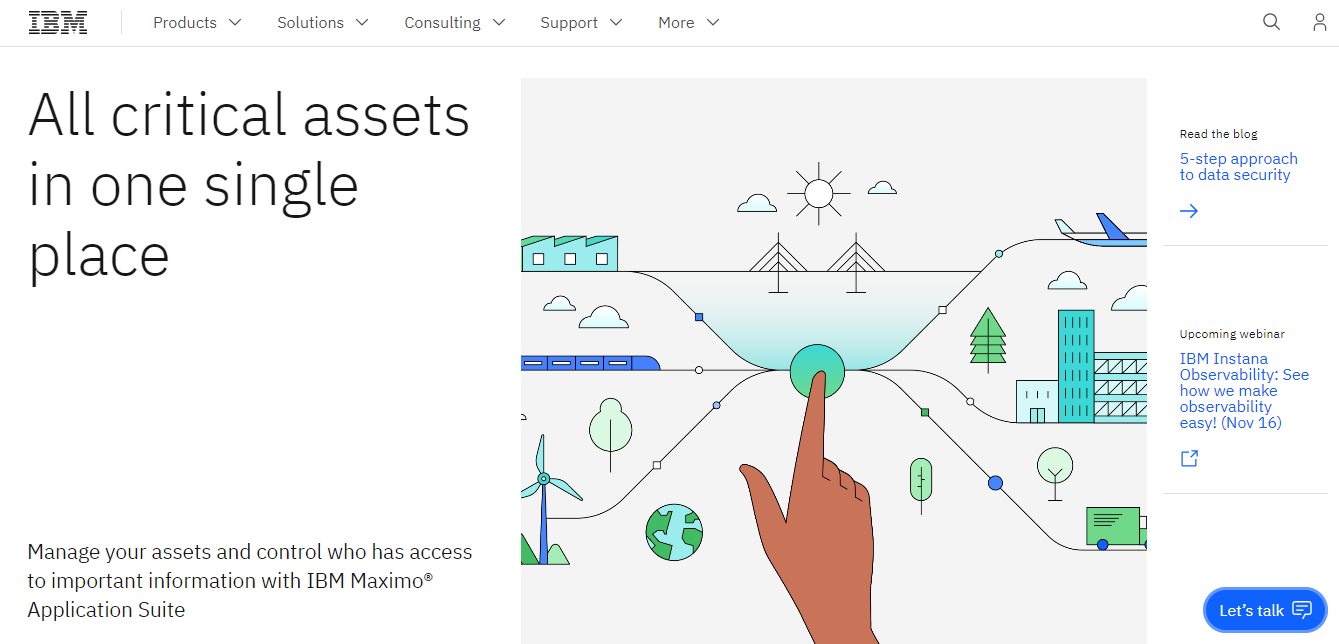
IBM Business Process Manager stands at the forefront of business process management tools, offering a comprehensive approach to enhance the efficiency of your organizational workflows. This robust system comprises five integral components, each crucial in optimizing your business's entire lifecycle. The platform offers an operational excellence journey where every phase is meticulously designed to optimize your business processes and elevate organizational efficiency.
Key Features:
Process Design and Modeling: In the initial phase, IBM BPM allows you to design and model new processes, aligning them with your organization's workflow and overarching business objectives. Additionally, it enables an examination of existing processes to determine their inclusion for further refinement.
Process Development and Testing: Once processes are defined and modeled, the focus shifts to implementation. The process development phase involves the addition of activities, services, events, user interfaces, and more, followed by rigorous testing to ensure seamless functionality.
Process Deployment: After successful implementation and testing, IBM BPM facilitates the smooth deployment of processes into your business environment, ensuring a seamless transition into day-to-day operations.
Process Participation and Performance Monitoring: Gain valuable insights into the performance of individuals, teams, and overall processes. With IBM BPM, you can actively monitor deployed strategies to ensure they align with expectations, providing the visibility needed for informed decision-making.
Process Improvements: IBM BPM empowers you to monitor the overall system performance and specific process applications. This functionality allows for continuous refinement of models to enhance overall performance. Leverage Key Performance Indicators (KPIs) to analyze process and task performance, facilitating data-driven improvements.
Customer Rating
G2: 4.1/5
Capterra: 4.2/5
4. Appian BPM Suite
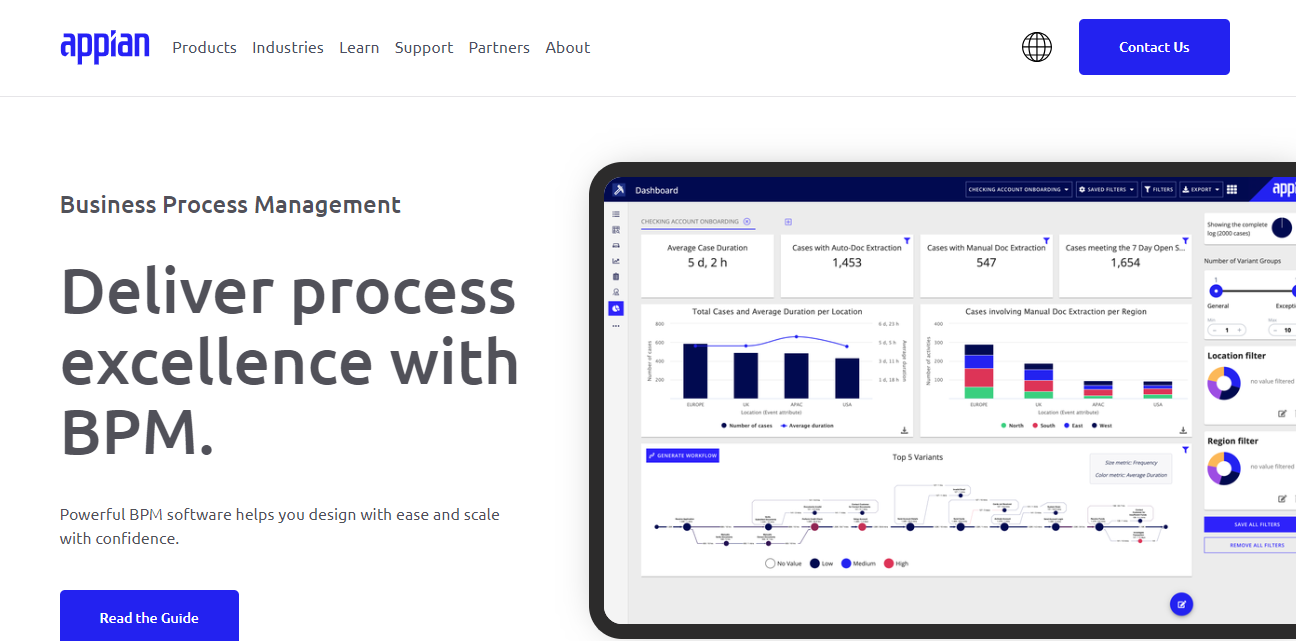
Appian BPM suite is a dynamic business process management tool empowering businesses with streamlined workflow automation to enhance operational efficiency and governance. This comprehensive tool seamlessly integrates people, technologies, and data into a unified workflow, transforming your organization's operations.
By utilizing Appian, you not only automate your entire business but also simplify the intricate design of your workflows. This business process automation software goes beyond mere automation; it serves as a vigilant monitor for your business processes. Gain insights into organizational needs, identify inefficiencies, stay abreast of regulatory changes, and track emerging trends. This wealth of information enables you to act proactively, offering ample opportunities for process improvement.
One distinctive strength of Appian BPM lies in its advanced Case Management capabilities, fostering user collaboration to yield superior process outcomes. The tool ensures that users and groups access precisely the right data and actions, optimizing the efficiency of your processes.
Key Features:
Holistic Automation: Appian's BPM suite excels in automating the workflows of entire organizations, ensuring a comprehensive approach that spans people, technologies, and data.
Process Monitoring and Analysis: The tool provides robust capabilities for tracking and analyzing business processes. This includes assessing organizational needs, identifying inefficiencies, responding to regulatory changes, and staying ahead of industry trends.
Case Management Collaboration: Leveraging advanced Case Management capabilities, Appian facilitates user collaboration for optimal process outcomes. This ensures that teams work seamlessly together, enhancing overall efficiency.
Access Control for Efficiency: Appian BPM ensures that users and groups have access to the right data and actions, optimizing the efficiency of processes. This precise control enhances security and streamlines workflow execution.
Customer Rating
G2: 4.5/5
Capterra: 4.2/5
5. CMW Tracker
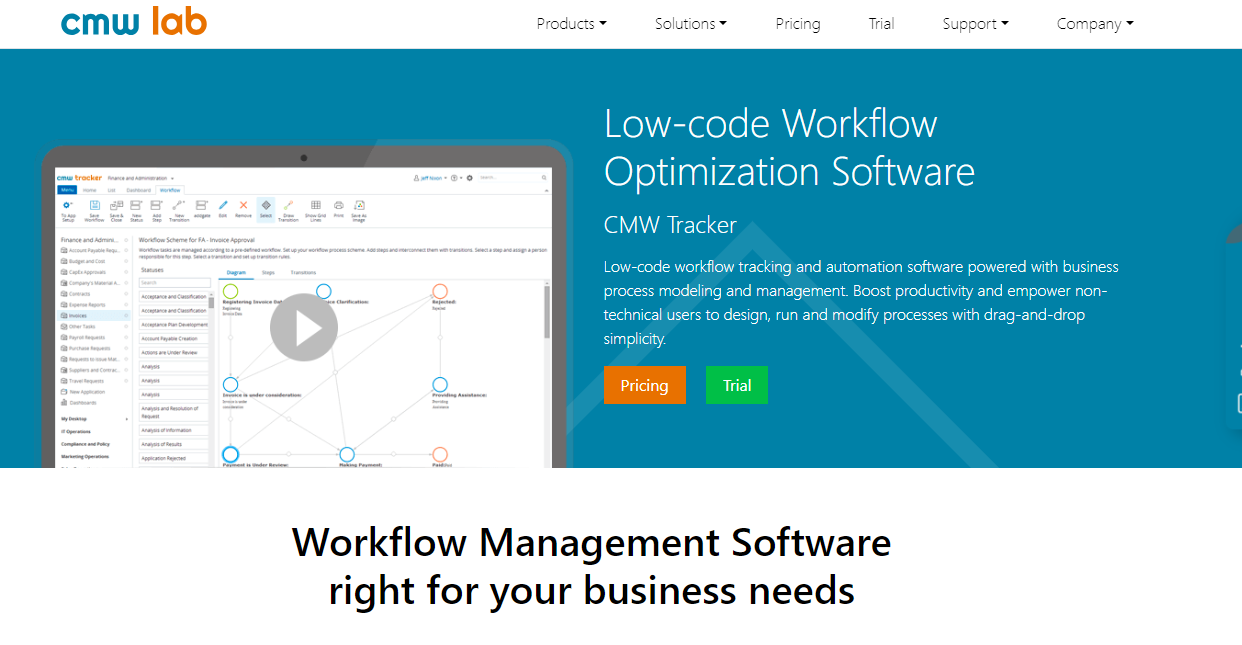
CMW Tracker is a sophisticated business process management tool specializing in business process modeling, management, workflow automation, and productivity optimization. This innovative tool reduces reliance on IT resources, offering the capability to effortlessly design, execute, and modify processes with heightened efficiency.
CMW Tracker redefines workflow management by offering various applications designed for various departments and workflow scenarios, instilling a new level of transparency in business operations.
Key features:
Transparent Capital Expenditure: CMW Tracker enhances visibility in capital expenditure and complex business processes, ensuring clarity and efficiency in request and approval workflows.
Centralized Document Management: The platform serves as a centralized hub for document management, encompassing discussions, task history, automated document workflow management, and more.
Streamlined IT Workflows: Optimize your IT workflows with CMW Tracker, covering processes such as IT support requests, access approvals, change management, and other essential IT service operations.
Efficient Claim Processing: CMW Tracker creates tailored claim forms for diverse request types, automating the entire claim processing workflow. This feature provides a transparent overview of claims handling.
Insightful HR Operations: Gain visibility into daily HR operations with CMW Tracker, automating workflows for tasks like employee onboarding, administrative assistance, and other HR processes. This ensures seamless and efficient HR management.
Customer Rating
G2: 4.6/5
Capterra: 4.6/5
6. Arrayworks
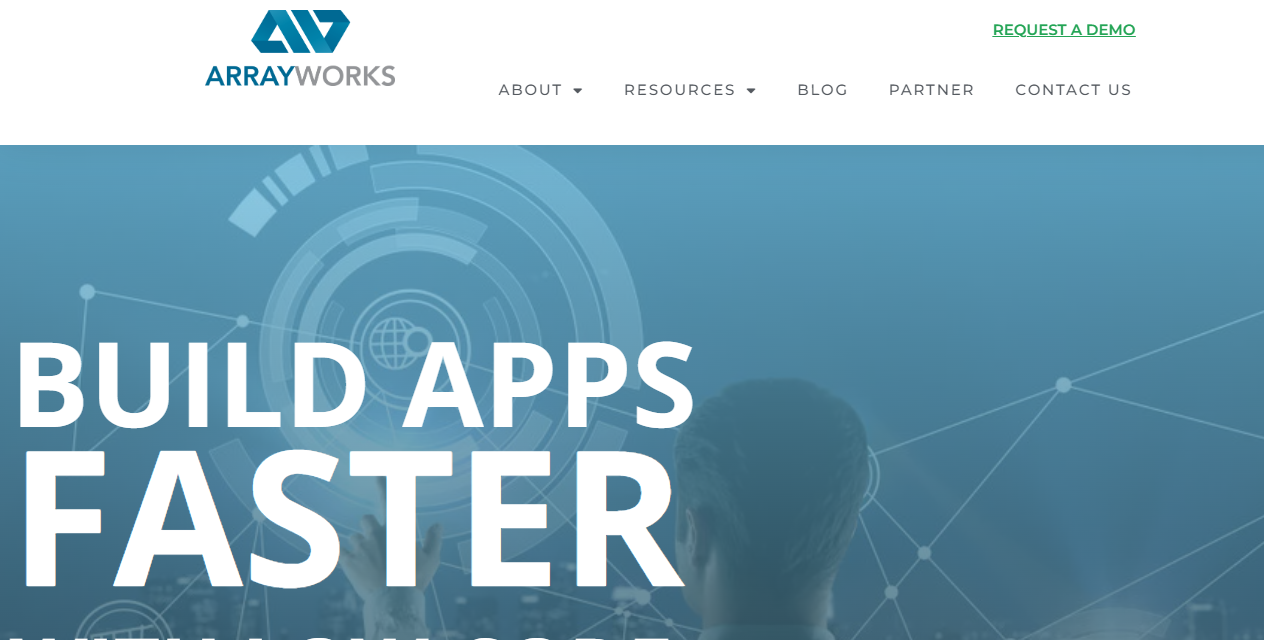
Arraywork is an advanced low-code robotic process automation platform meticulously crafted to automate and address intricate business challenges. This unified platform seamlessly integrates processes, artificial intelligence, the Internet of Things (IoT), digital twins, data integration, and more, offering a comprehensive solution for your business needs.
Its automated documentation of processes saves time and resources and ensures compliance with organizational policies, contributing to cost-effectiveness in project management. Also, it enables real-time operational insights for business users to make strategic decisions.
Key Features
Adaptive Process Design: Arrayworks simplifies process design, ensuring continuous adaptation for delivering engaging and efficient experiences.
Unified Multichannel Engagement: Engage seamlessly across all channels within a single platform solution, streamlining communication and enhancing user experience.
Robust Security Measures: The platform prioritizes security at every level, safeguarding the privacy and confidentiality of information throughout your processes.
Efficient Auto-Documentation: Arrayworks allows for automatic documentation of processes, saving valuable time and resources while ensuring adherence to organizational policies.
Digital Transformation of Documents: Digitize all your documents and securely process business forms anytime, anywhere, on any device, facilitating a smooth transition to digital workflows.
Customer Rating
G2: 4.4/5
Capterra: 4.2/5
7. Workflow Automation by Nintex
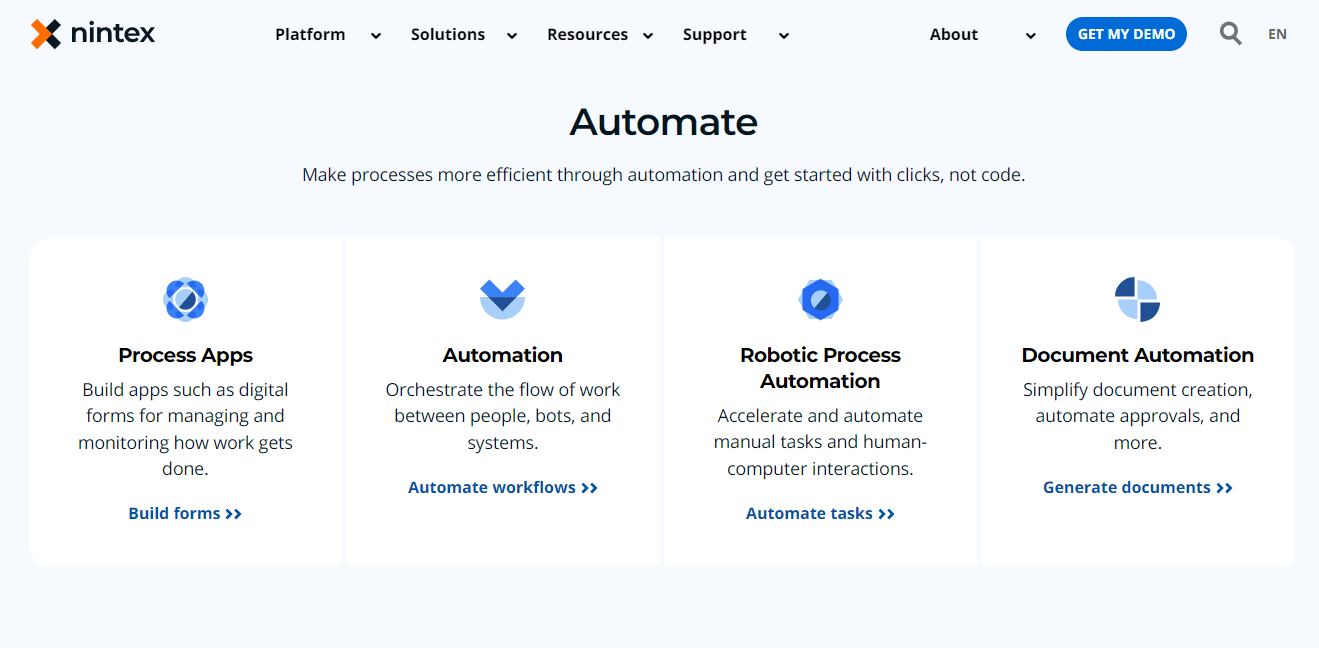
Nintex Business Automation Platform is a transformative solution designed to empower organizations by streamlining and enhancing their operational efficiency. Offering a robust suite of tools, Nintex facilitates the seamless management, automation, and optimization of diverse business processes. With an intuitive visual approach, the platform empowers users to plan, map, and collaboratively manage workflows, ensuring a holistic and streamlined approach to business operations.
At the core of Nintex is a commitment to simplicity and effectiveness. By easily defining, designing, and managing processes, organizations can unlock the full potential of their operational workflows. Nintex identifies and automates processes tailored to specific needs and transcends traditional boundaries by eliminating paper forms, automating manual tasks, and enabling the swift generation of documents with secure e-signatures.
Key Features:
Process Identification and Automation: Nintex enables the identification of processes best suited for automation needs, eliminating paper forms and transitioning to virtual information capture.
Efficient Workflow Automation: Streamline operations by automating manual and repetitive tasks through workflows, enhancing efficiency and reducing the margin for error.
Automated Document Generation and E-Signatures: Nintex goes beyond automation by automatically generating documents and facilitating e-signatures, ensuring a seamless and paperless workflow.
Data Optimization: The platform optimizes your business by leveraging data generated through automated processes, providing valuable insights for informed decision-making.
Process Monitoring and Visualization: Nintex helps monitor processes, utilize data visualization tools to gain insights, and update process mapping dynamically. This ensures continuous improvement and adaptability in response to evolving business needs.
Customer Rating
G2: 4.2/5
Capterra: 4.1/5
8. Oracle Business Process Management Suite
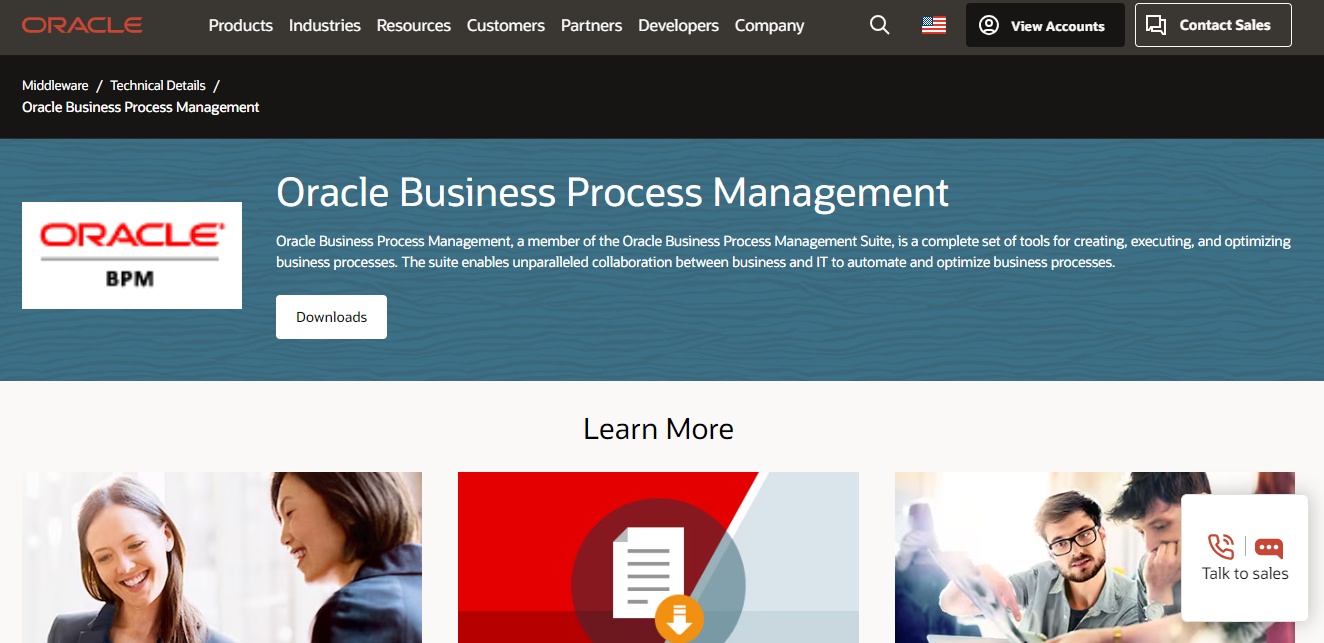
Oracle's business process management suite involves a set of tools for creating, executing, and optimizing business processes. This enables collaboration between business and IT to automate and optimize business processes.
The tools track cases, events, and tasks in the organization. Its advanced features offer a unified solution for processes, cases, rules, tasks, forms, analytics, and integration. It provides support for collaboration and improves process efficiency with advanced workflows. Also, it improves the quality of the process by increasing utilization.
Furthermore, it increases visibility into process performance by providing real-time analytics. This simplifies compliance by providing transparent data.
Key features:
Comprehensive Process Automation: Oracle Business Process Management Suite offers a robust and comprehensive solution for automating a wide range of business processes. It allows organizations to design, model, and deploy processes efficiently, streamlining operations for enhanced productivity.
Adaptive Case Management: The suite incorporates adaptive case management capabilities, allowing organizations to manage unstructured processes dynamically.
Business Activity Monitoring (BAM): Oracle BPM Suite includes Business Activity Monitoring, allowing organizations to gain real-time insights into their business processes.
User-Friendly Process Modeling: The suite offers a user-friendly process modeling environment, empowering business users and analysts to participate actively in the design and improvement of business processes.
Customer Rating
G2: 4/5
Capterra: 4.6/5
9. Bizagi Modeler - BPM Suite
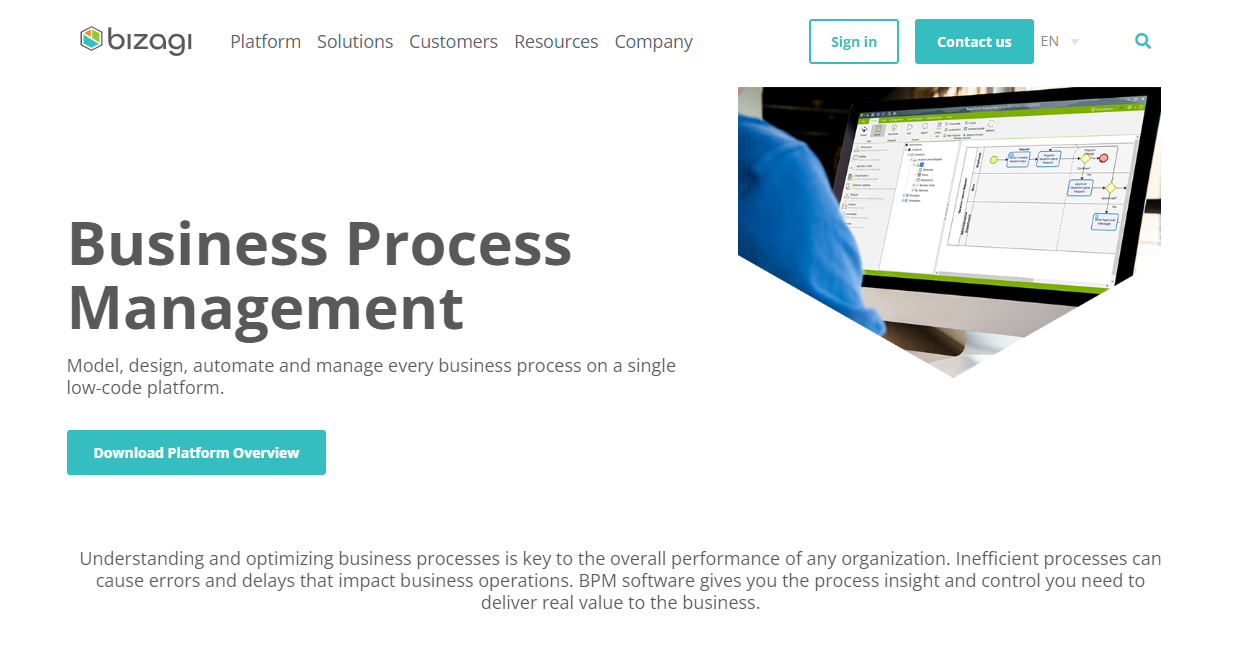
Bizagi Business Process Management (BPM) suite is an integrated business process management tool designed to revolutionize how you model, design, automate, and manage your business processes. This comprehensive tool not only facilitates a deeper understanding of your organization's workflows but also empowers you to optimize processes for enhanced overall performance.
Bizagi Engine BPM software goes beyond conventional solutions by providing invaluable process insights, enabling you to add substantial value to your business operations. This innovative no-code platform's key features include reducing manual processes and effectively cutting costs while boosting operational efficiency.
One of its standout capabilities is fostering real-time collaboration between business and IT infrastructure. This dynamic interaction ensures alignment with business requirements, facilitating the delivery of results that meet the ever-evolving needs of your organization.
Key features
Adaptable Process Management: In the Bizagi platform, processes are designed for flexibility. Share, reuse, and effortlessly adapt processes to promptly respond to shifts in the market landscape.
Dynamic Performance Monitoring: Utilize real-time and historical reports within Bizagi to monitor the performance of your business processes actively. Identify areas for improvement and seize opportunities to enhance operational efficiency.
Integrated Data Centralization: Bizagi seamlessly connects with applications, databases, and legacy systems, offering a centralized view of crucial business data. This integration ensures a comprehensive and cohesive approach to managing and leveraging essential information.
Customer Rating
G2: 4.2/5
Capterra: 4.4/5
10. TIBCO Software
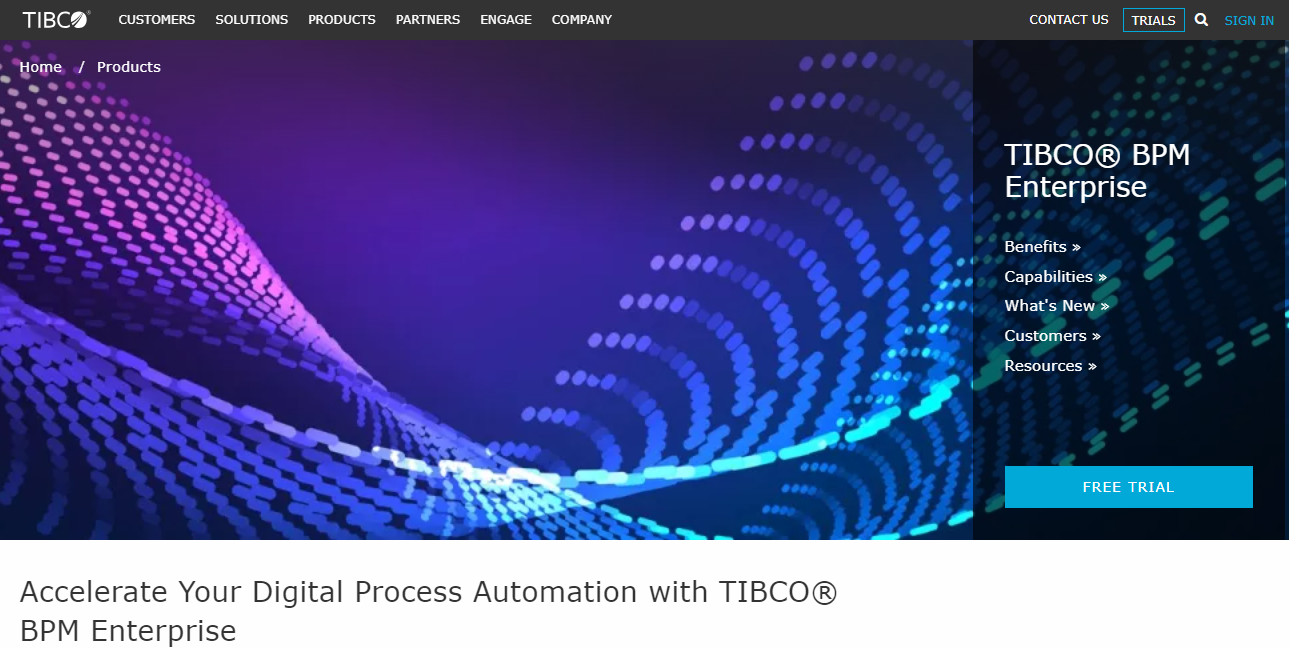
TIBCO offers BPM enterprise software that helps accelerate your digital process automation. This collaborates with the process, people, context, and action for optimizing your business outcomes.
The platform allows you to digitize your business and automate processes. You can innovate business operations and reduce delays, costs, and errors. It offers powerful features like case management, work management capabilities, cloud-native deployment, and more.
Key Features
Case Management Excellence: TIBCO BPM has robust case management capabilities and intuitive visual case data modeling. This empowers users to formalize processes, refine operational procedures, and effectively manage performance.
Comprehensive Process Automation: Streamline your operations with TIBCO BPM, as it seamlessly automates all your business processes within a unified platform, covering a spectrum of process styles for a holistic approach.
Cloud-Native Deployment: Experience the agility of cloud-native deployment with TIBCO BPM. Benefit from horizontal scaling, load balancing, and self-healing features that ensure reliability and efficiency in your operations.
User-Friendly Interface: TIBCO BPM boasts an intuitive interface constructed with Open APIs, facilitating aligning business needs with overarching goals. This user-centric design enhances adaptability and promotes a seamless integration of business processes with strategic objectives.
Customer Rating
G2: 4.3/5
Capterra: 4.2/5
11. Process Maker
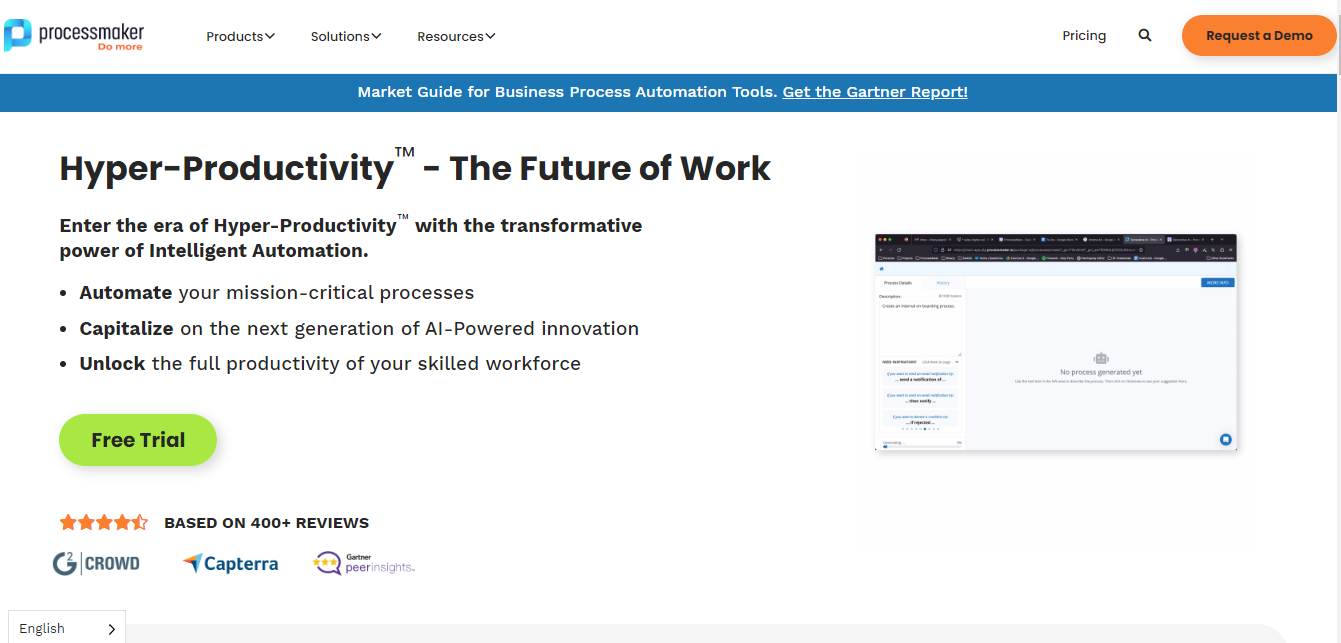
Process Maker is a business process management tool that automates your complex workflow. This helps design, automate, and deliver the business process that accelerates and streamlines your business workflow. It mitigates risk and compliance at your organization.
With Process Maker, you can monitor processes, business objectives, and SLAs with the customizable dashboard. It captures and distributes data with support to eliminate errors and automate approvals.
Moreover, it provides real-time alerts that trigger all stakeholders to stay updated and allow them to respond with Business Activity Monitoring (BAM). Process Maker assists you with connecting the existing third-party systems via API and improving work quality.
Key Features
Workflow Automation: Process Maker excels in automating complex workflows, providing a streamlined and efficient solution for business process management.
Intuitive Process Design: The software offers an intuitive process design interface, empowering users to create, modify, and optimize workflows with ease.
Collaborative Environment: Facilitating collaboration, Process Maker enables teams to work together seamlessly within the platform, enhancing communication and coordination.
Customizable Workflows: Tailor workflows to specific business needs with Process Maker's customizable features, ensuring a personalized approach to process automation.
Real-time Monitoring: Gain insights into workflow performance through real-time monitoring, allowing for informed decision-making and continuous process improvement.
Customer Rating
G2: 4.3/5
Capterra: 4.4/5
12. Kissflow
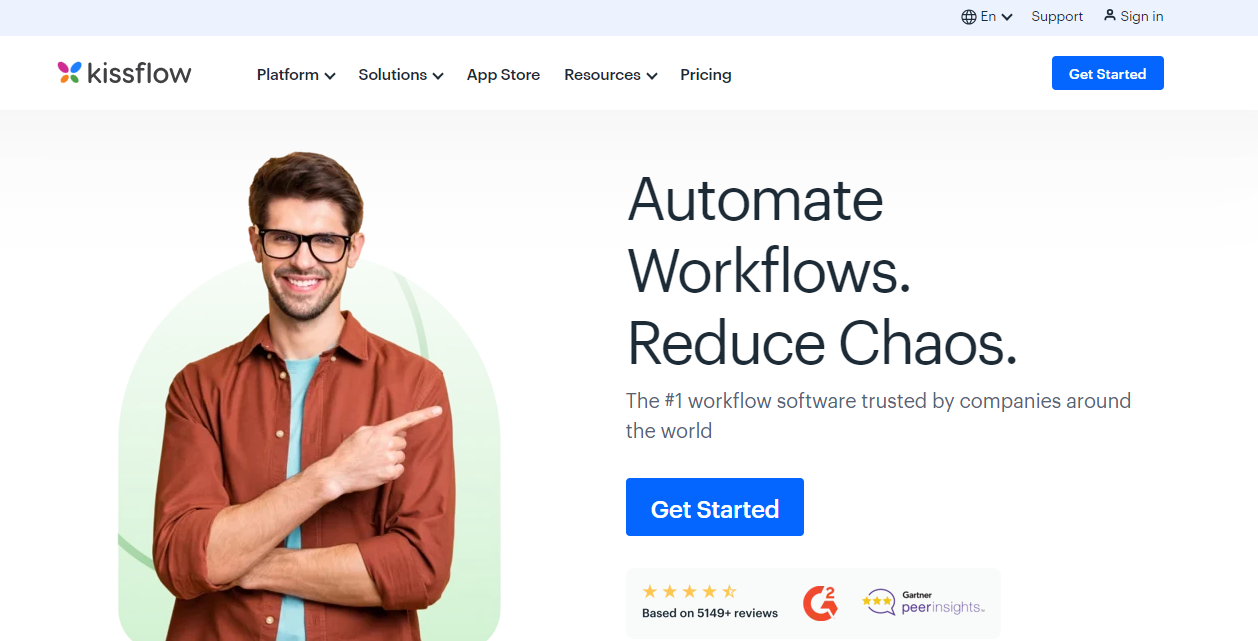
Kissflow is a business process management software that enables organizations to streamline their business processes for digital optimization. It allows you to automate process flows, enforce business rules, and make process changes for the betterment of your business.
Also, it supports all types of collaborative workflows, such as processes, cases, projects, and more. Their process stream allows stakeholders to collaborate efficiently.
Key Features
Dynamic Process Insights: Kissflow provides real-time information on every process, offering dynamic insights and facilitating informed decision-making.
Customized Reporting: Generate custom reports tailored to your business needs, allowing for a deeper understanding of processes and improved analysis.
Visual Workflow Creation: Design your workflows visually with Kissflow, offering a user-friendly interface that allows easy modifications whenever necessary.
Multi-Device Accessibility: Access data seamlessly from multiple devices, ensuring flexibility in workflow management while automated assignments, escalations, and notifications mitigate risks and reduce errors.
Integration Capabilities: Link your workflows with third-party systems effortlessly using Kissflow's integration tools, fostering a connected and cohesive business environment.
Customer Rating
G2: 4.3/5
Capterra: 3.9/5
13. Agiloft
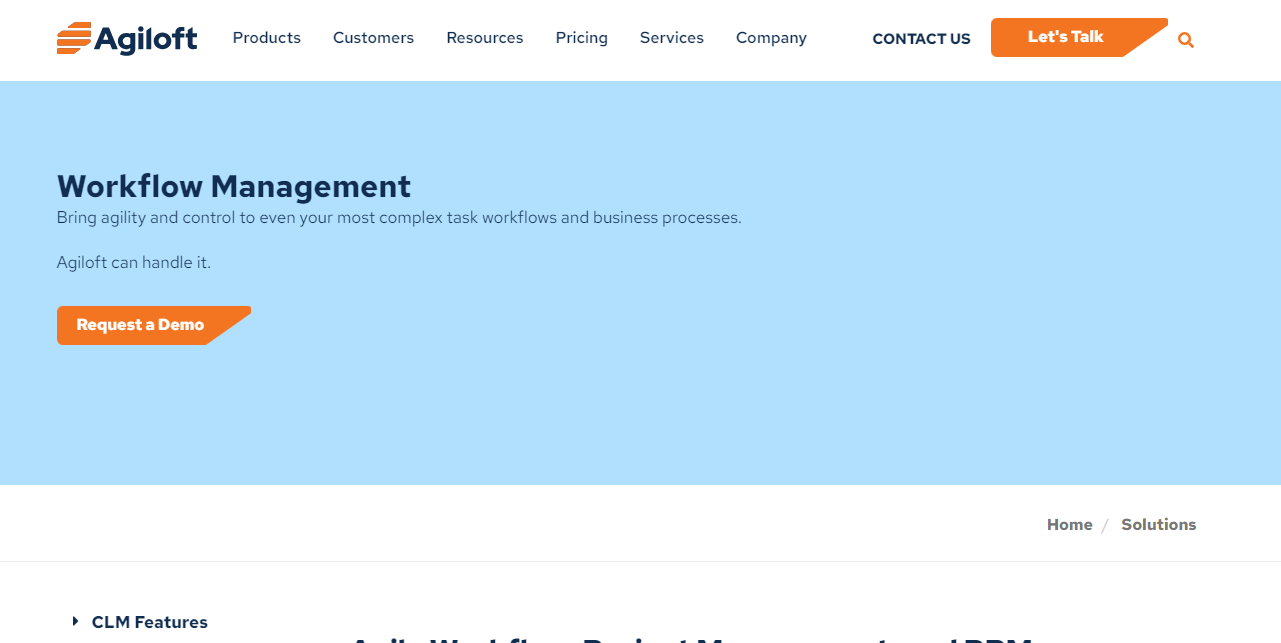
Agiloft presents robust workflow management software designed to enhance efficiency, performance, and communication throughout your organization. With a highly configurable framework, it empowers you to automate and manage intricate task flows and tailor workflows to unique business processes.
This software's capabilities extend to boosting efficiency organization-wide by automating critical workflows, including onboarding new employees or partners. Additionally, it is crucial in minimizing manual errors and preventing the duplication of vital data, such as employee or asset information, ensuring streamlined and error-free processes.
Key Features
Status and Transition Control: Harness Agiloft's workflow functionality seamlessly controls your processes' status and transitions, ensuring a well-managed and organized workflow.
Customizable Task Templates: Tailor task templates or approval workflows based on specific task requirements, providing flexibility and adaptability in your workflow management.
Data Validation and Automation: Agiloft goes beyond by validating your data, triggering time-based notifications, and seamlessly updating data in linked records or external systems. This ensures accuracy, timely alerts, and seamless data synchronization throughout your workflows.
Customer Rating
G2: 4.6/5
Capterra: 4.8/5
14. Blueprint Business Process Management
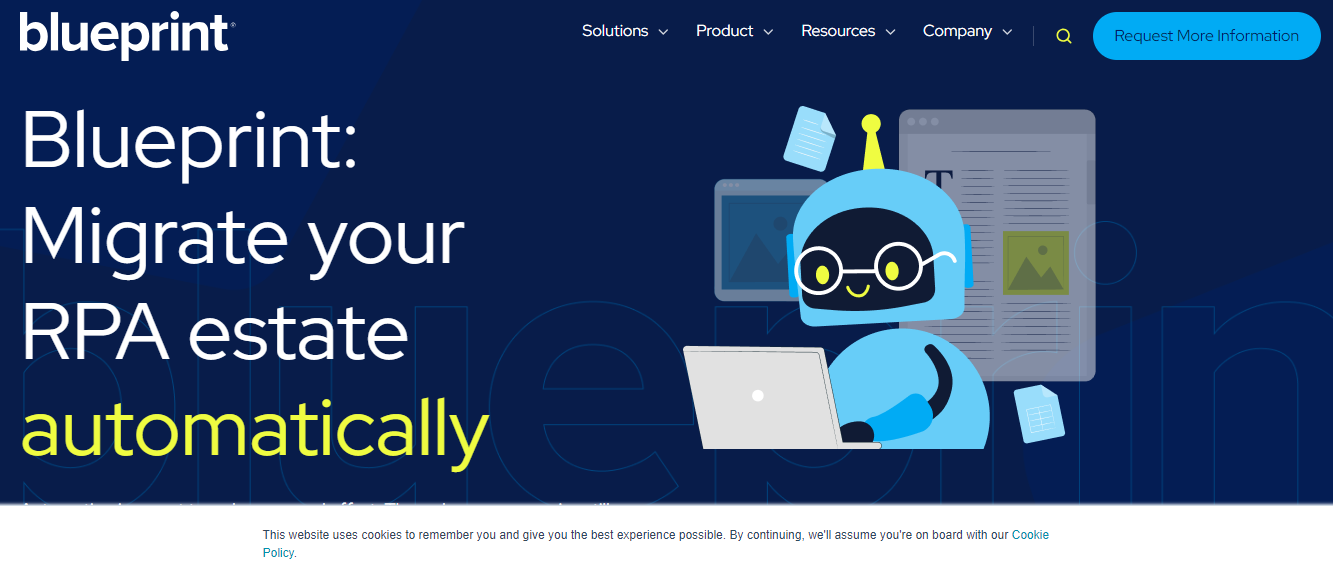
Blueprint business process management goes beyond understanding your business processes; it actively identifies areas for enhancement, providing organizations with continuous insights for sustained improvement. Through a meticulous analysis of your automation processes, it optimizes, reuses, and suggests improvements, elevating your entire automation landscape.
This platform delves into your business processes, consolidating data from the entire process ecosystem in a centralized platform. Its real-time advanced reporting unveils critical details. Thus offering proactive insights that aid in prioritizing and planning future state improvements, facilitating strategic decision-making.
Blueprint allows you to design processes based on collected data, ensuring consistent execution through validation. By enforcing governance and compliance aligned with business rules, regulations, and standards, Blueprint becomes an integral tool for orchestrating processes that meet and exceed expectations.
Key Features
Holistic Process Insights: Blueprint provides a deep understanding of business processes, identifying areas for improvement and delivering continuous insights to help organizations achieve the desired levels of efficiency consistently.
Optimization and Reuse: Through comprehensive analysis, Blueprint optimizes automation processes, encourages reuse, and suggests improvements, contributing to the enhancement of the entire automation estate.
Centralized Data Connectivity: The platform analyzes business processes by connecting data from the entire process ecosystem within a centralized platform. This real-time connectivity allows for detailed insights and facilitates proactive decision-making.
Strategic Planning with Proactive Insights: Blueprint prioritizes and plans for future state improvements by offering proactive insights derived from real-time reporting. This feature enables IT teams to make strategic decisions based on business collaborations and thoroughly understand their business processes.
Customer Rating
G2: 4/5
Capterra: 3.8/5
15. Bonitasoft
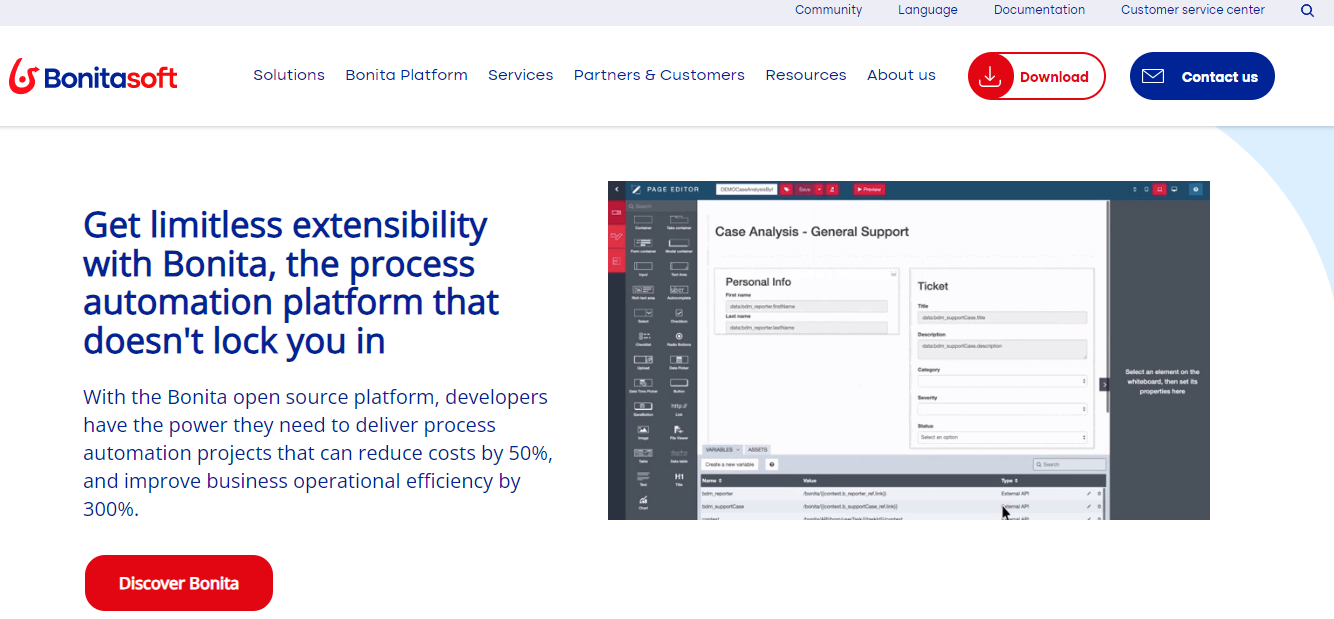
Bonitasoft is an open-source business process management software that enhances visibility and insights to refine business processes, manage tasks, and optimize API calls. It facilitates the visualization of process execution, identification of inefficiencies, error detection, and exploration of process optimizations.
This business process management tool facilitates the visualization of process execution, the identification of inefficiencies, error detection, and the exploration of process optimizations.
Key Features:
Performance Reporting for Real-time Insights: Bonitasoft empowers you to monitor and control processes, applications, and business data through performance reporting, providing real-time insights that enhance decision-making and process optimization.
Accelerated Business Innovations with Bonita Cloud: Leveraging Bonita Cloud accelerates business innovations by fostering better collaboration between business and IT teams. It ensures continuous delivery for your teams, keeping them seamlessly up-to-date with the latest developments.
Security Collaboration with Cybersecura: Bonitasoft collaborates extensively with Cybersecura to reinforce the security of your cloud applications. Security controls are intricately woven into every layer, ensuring robust data protection, privacy, and overall data security. This collaboration ensures continuous security reinforcement for your business processes.
Customer Rating
G2: 4.5/5
Capterra: 4.4/5
16. Webmethods BPMS by Software AG
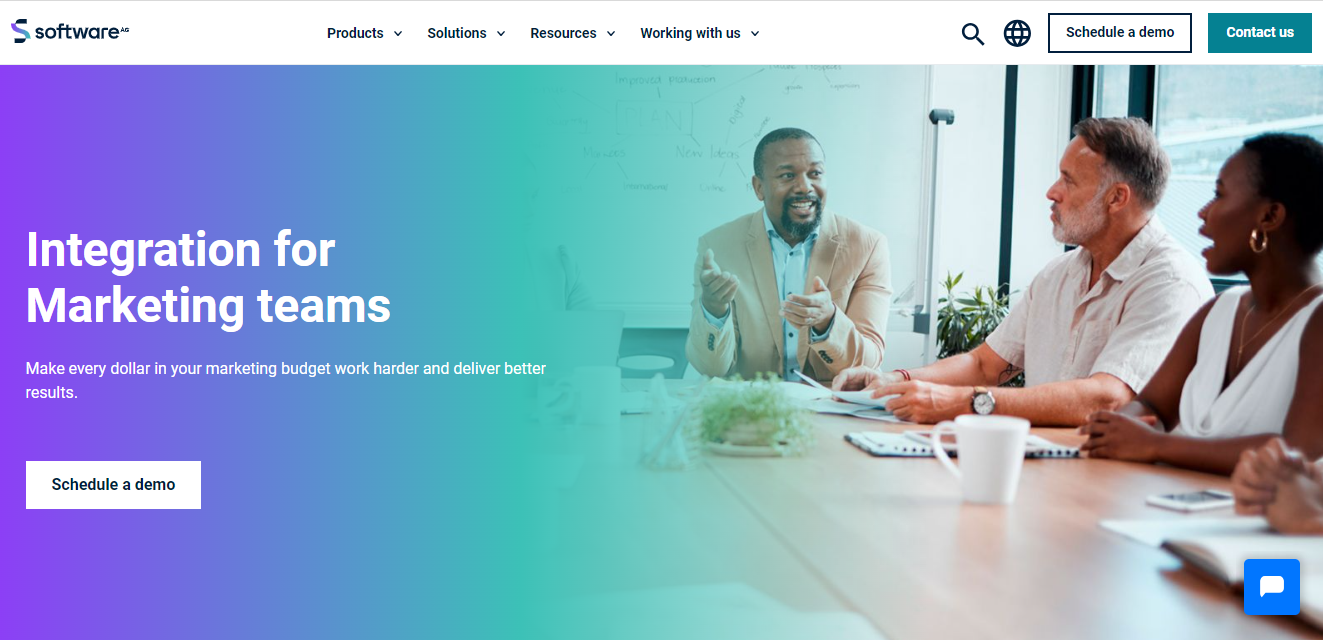
Software AG introduced the business process management platform, a transformative tool designed to eliminate manual process steps, reduce error rates, and accelerate workflows, ultimately lowering costs. This suite provides unparalleled visibility, agility, and consistency in business processes, empowering users to identify, implement, and refine processes while focusing on continuous improvement.
The system features a customizable inbox, allowing users to seamlessly view, act on, and collaborate on assigned tasks. Thus enhancing overall task management. An integrated recommendation engine offers automation capabilities and enhances task completion efficiency. Additionally, robust task and team management functionalities optimize interpersonal interactions within your processes.
Key Features
Efficient Process Execution: WebMethods BPMS ensures the smooth execution of organized processes within a transparent and efficient landscape, promoting operational excellence.
Dynamic Business Rules Management: This tool allows for defining and modifying business rules at any time, providing flexibility and adaptability to changing business requirements.
Closed-Loop Analytics: With closed-loop analytics, users can take proactive measures based on alerts generated from milestones, goals, and Service Level Agreements (SLAs), ensuring timely and informed decision-making.
Real-time Business Activity Monitoring: Proactively identify and address process issues in real-time with comprehensive business activity monitoring, safeguarding overall returns from potential impacts.
Selecting The Right Business Process Management Tool
And there you have it — a curated collection of 16 business process management tools recommended by experts. Choosing the right tool in the dynamic landscape of organizational management is pivotal for shaping efficiency and success. Carefully evaluating features, scalability, and alignment with organizational needs allows you to pinpoint your business's most effective BPM tool. This decision represents a strategic investment in streamlined processes, improved collaboration, and, ultimately, the long-term prosperity of your organization. Therefore, it is necessary to approach the selection process with a comprehensive understanding of your organization's unique requirements and objectives.
FAQs
What is Business Process Management, and how do BPM tools contribute to organizational efficiency?
Business Process Management (BPM) is a systematic approach to improving an organization's processes by managing and optimizing them for efficiency and effectiveness. Business Process Management tools are crucial by providing a platform to model, automate, and streamline business processes. These tools help organizations identify bottlenecks, enhance collaboration, and ultimately improve overall operational performance.
How do BPM tools facilitate process automation, and what benefits can businesses expect from this automation?
BPM tools enable process automation by allowing businesses to model and execute their processes in a digital environment. This automation increases operational efficiency, reduces manual errors, and faster task completion. Businesses can expect benefits such as cost savings, improved accuracy, and the ability to reallocate resources to more value-added activities.
Can BPM tools adapt to the specific needs and scale of different businesses?
Yes, BPM tools are designed to be adaptable and scalable to meet the unique requirements of various businesses. These tools offer customization options, allowing organizations to tailor the processes to their specific needs. Whether a small startup or a large enterprise, BPM tools can be configured to accommodate the scale and complexity of different business operations.
How do BPM tools enhance collaboration and communication within an organization?
Business process management tools provide a centralized platform for process modeling, execution, and monitoring. This fosters collaboration by ensuring that all stakeholders have visibility into the processes they are involved in. Through features like task assignments, notifications, and real-time updates, BPM tools promote seamless communication among team members, departments, and stakeholders, leading to improved coordination and decision-making.
About the author
Tathagata is a Technical Content Writer with 4+ of experience in the SaaS industry. He has a keen eye for research and understanding macro trends in the SaaS & AI-based technology space. He has worked across several marketing & strategy roles in various domains like banking, e-commerce, and education sectors. In his leisure time, Tathagata is a full-time PC gamer.
Related Blogs
See More
Subscribe to our Newsletter
Get updates in your inbox
